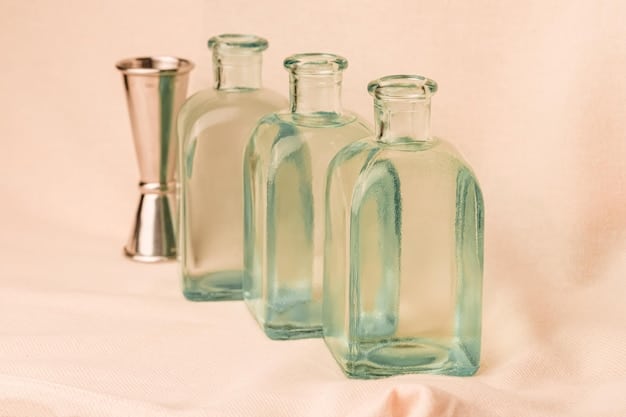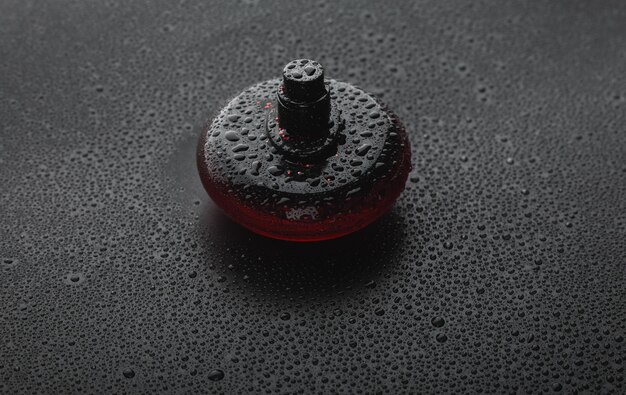Is Your Perfume Expired? 5 Signs It’s Time to Replace It

Is your perfume expired? You can usually tell if your perfume has expired by changes in its scent, color, or consistency, and while expired perfume isn’t dangerous, it won’t smell as intended.
Ever wondered if that beloved bottle of perfume on your dresser has seen better days? Just like food and makeup, fragrances don’t last forever. So, **is your perfume expired**? Let’s explore the telltale signs it’s time to say goodbye to your favorite scent.
Is Your Perfume Expired? Decoding the Shelf Life of Your Scent
Fragrances, much like fine wines, evolve over time. However, unlike wine, this evolution isn’t always for the better. The shelf life of a perfume is influenced by various factors, including its composition, storage, and exposure to environmental elements. How long can you reasonably expect your favorite scent to last?
Typically, perfumes have a shelf life of about three to five years. However, this is just a general guideline. Certain ingredients and storage habits can significantly affect a perfume’s longevity. Understanding these factors can help you determine if your perfume is still at its peak or showing signs of expiration.
Composition Matters
The ingredients in a perfume play a crucial role in how long it lasts. Perfumes with heavier base notes tend to last longer than those with lighter, more volatile top notes. Citrus-based fragrances, for example, often have a shorter shelf life due to the unstable nature of citrus oils.
Storage Counts
Proper storage is essential for preserving the quality of your perfume. Exposure to heat, light, and humidity can accelerate the degradation process. Storing your perfume in a cool, dark, and dry place can significantly extend its lifespan.
- Keep perfumes away from direct sunlight.
- Store them in a cool environment, like a closet or drawer.
- Avoid storing perfumes in the bathroom due to humidity.
In conclusion, while a perfume’s shelf life is generally three to five years, understanding the factors that influence its longevity can help you enjoy your favorite scents for as long as possible. Proper storage and awareness of the perfume’s composition are key to maintaining its quality.
Sign #1: A Change in Scent
One of the most obvious indicators that your perfume might be past its prime is a noticeable change in its scent. The fragrance might not smell quite like you remember, or it could have developed an off-putting odor. What causes these olfactory alterations?
Perfume comprises various fragrance notes, each with its own volatility. As perfume ages, these notes can degrade or evaporate, leading to an imbalance in the overall scent profile. This can result in a perfume that smells sour, metallic, or simply “off.”

Oxidation and Degradation
Exposure to air can cause oxidation, a chemical reaction that alters the perfume’s composition. This can lead to the development of unpleasant odors. Additionally, some fragrance ingredients may degrade over time, further contributing to changes in scent.
Top, Middle, and Base Note Shifts
Perfumes are designed with top, middle, and base notes that unfold over time. An expired perfume may lose its top notes quickly or have a distorted dry-down due to the degradation of base notes. This imbalance can make the scent unrecognizable.
In summary, changes in scent are a significant sign that your perfume may have expired. These changes can be caused by oxidation, degradation of ingredients, or shifts in the balance of fragrance notes. Trust your nose and discard any perfume that no longer smells as intended.
Sign #2: Discoloration of the Liquid
Another telltale sign that a perfume has expired is a change in its color. Fresh perfume typically has a clear or lightly tinted appearance. However, as it ages, the liquid can become darker or cloudier. Why does this happen, and what does it indicate about the perfume’s condition?
Discoloration is often a result of chemical reactions occurring within the perfume. Exposure to air, light, and heat can cause the perfume’s ingredients to break down and change color. This is especially common in perfumes that contain natural ingredients, which are more prone to oxidation and degradation.
Chemical Reactions
The chemical compounds in perfume can react with oxygen, light, or other substances, leading to discoloration. These reactions can produce new compounds that alter the perfume’s appearance.
Sedimentation
Over time, some perfumes may develop sediment at the bottom of the bottle. This sediment consists of insoluble particles that have precipitated out of the solution. While sedimentation doesn’t always indicate expiration, it is a sign that the perfume’s composition has changed.
- Check the perfume’s color against its original appearance.
- Look for any cloudiness or sediment in the liquid.
- Be aware that darker colors often indicate oxidation.
In conclusion, discoloration of the liquid is a visual sign that your perfume may have expired. This discoloration is often caused by chemical reactions or sedimentation. If you notice a significant change in color, it’s best to discontinue use and replace the perfume.
Sign #3: Change in Consistency
Beyond changes in scent and color, the consistency of your perfume can also indicate its age and condition. Fresh perfume should have a smooth, uniform texture. If you notice that your perfume has become thicker, stickier, or more viscous, it may be expired.
Changes in consistency are often due to the evaporation of volatile compounds in the perfume. As these compounds evaporate, the remaining ingredients become more concentrated, leading to a change in the perfume’s texture. This can also affect how the perfume sprays and feels on your skin.
Evaporation of Alcohol
Most perfumes contain alcohol, which helps to dissolve and disperse the fragrance oils. Over time, the alcohol can evaporate, causing the perfume to become thicker and more concentrated. This can also alter the scent profile.
Resinification
Some perfumes contain resins or other viscous ingredients. As these ingredients age, they can undergo a process called resinification, which causes them to become even thicker and stickier. This can affect the perfume’s spray mechanism and overall usability.

In summary, a change in consistency is another sign that your perfume may have expired. This change is often caused by the evaporation of alcohol or resinification of viscous ingredients. If your perfume has become noticeably thicker or stickier, it’s time to consider replacing it.
Sign #4: Shortened Longevity
One of the key qualities of a good perfume is its longevity – how long the scent lasts on your skin after application. If you’ve noticed that your perfume’s staying power has diminished, it could be a sign that it’s past its prime. What factors contribute to this decline in longevity?
As perfume ages, its fragrance molecules can break down, making them less effective at adhering to your skin. This means that the scent will fade more quickly than it used to. Additionally, the evaporation of top notes can leave you with only the base notes, which may not be as long-lasting.
Breakdown of Molecules
The fragrance molecules in perfume are susceptible to degradation over time. As they break down, they lose their ability to linger on the skin, resulting in a shorter scent duration.
Loss of Top Notes
Top notes are the first scents you perceive when applying perfume. They are also the most volatile and tend to evaporate quickly. In an expired perfume, the top notes may disappear almost immediately, leaving you with a less complex and shorter-lived fragrance.
- Apply the perfume and monitor how long the scent lasts.
- Compare the longevity to when the perfume was new.
- Note any changes in the scent’s development over time.
In conclusion, shortened longevity is a practical sign that your perfume may have expired. This decline in staying power is often due to the breakdown of fragrance molecules or the loss of top notes. If your perfume no longer lasts as long as it used to, it’s likely time for a replacement.
Sign #5: Irritation or Allergic Reaction
While expired perfume might not always pose a serious health risk, it can sometimes cause skin irritation or allergic reactions. If you notice redness, itching, or other signs of irritation after applying your perfume, it’s essential to stop using it immediately. Why might expired perfume cause these reactions?
As perfume ages, its chemical composition can change, leading to the formation of new compounds that can irritate the skin. Additionally, bacteria or fungi may grow in the perfume, further increasing the risk of irritation or allergic reactions. It’s better to be safe than sorry when it comes to your skin’s health.
Formation of Irritants
The chemical changes that occur in expired perfume can lead to the formation of irritants that can cause skin reactions. These irritants may not have been present in the original formulation.
Bacterial Contamination
Expired perfume can become a breeding ground for bacteria or fungi, especially if it has been exposed to air or moisture. These microorganisms can cause infections or allergic reactions when the perfume is applied to the skin.
In summary, skin irritation or allergic reactions are important indicators that your perfume may have expired. These reactions can be caused by the formation of irritants or bacterial contamination. If you experience any adverse effects after using your perfume, discontinue use immediately and consult a dermatologist if necessary.
| Key Point | Brief Description |
|---|---|
| 👃 Change in Scent | Perfume smells sour, metallic, or “off.” |
| 🌈 Discoloration | Liquid becomes darker or cloudier. |
| 🧪 Consistency Change | Perfume gets thicker or stickier. |
| ⏳ Shortened Longevity | Scent fades quickly after application. |
Is My Perfume Expired?”>
▼
Most perfumes last between three to five years. This depends on the fragrance’s composition and how well it’s stored. Proper storage away from heat and light can extend its life.
▼
While it’s not generally dangerous, expired perfume may not smell as intended. The scent can change, and it may cause skin irritation in some individuals. It’s best to avoid using it.
▼
Store your perfume in a cool, dark, and dry place. Keep it away from direct sunlight, heat, and humidity to prevent the fragrance from breaking down prematurely, ensuring it lasts longer.
▼
Perfume can change color due to oxidation and chemical reactions among its ingredients. Exposure to light and air accelerates these processes, leading to discoloration and changes in the scent.
▼
Look for changes in scent, color, and consistency. If the perfume smells different, has become darker or thicker, or causes skin irritation, it’s likely expired and should be discarded.
Conclusion
Knowing the signs of expired perfume can save you from unwanted skin irritations and ensure you’re always smelling your best. If your fragrance exhibits any of the signs we’ve covered, then it’s time to part ways and discover a new signature scent.





